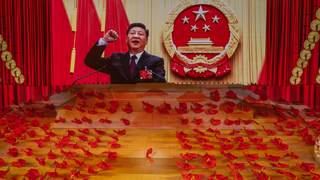The Chinese Communist Party’s celebrations are not just about marking 100 years of existence as an organisation. It’s a none-too-subtle way of telling the world that longevity grants it not only political and moral legitimacy, but superiority.
The message to the world is that it is wiser to work with this fact, and make the best of it.
This is the kind of reasoning that many outsiders find compelling, even if they remain uncomfortable with Xi Jinping’s ruthlessness. In this view, the world is filled with political parties we don’t agree with, and the CCP happens to rule over a country that is far too important.
It’s best to be pragmatic, and Australia is behind the rest of the world in this regard.
The more closely one scrutinises such reasoning, the more flawed it becomes. It is true liberal democracies can be incoherent, but the CCP is also making it extremely difficult for the Morrison government and others to pursue a truly balanced or pragmatic relationship with China.
The lessons we learn from history shape the way governments and political regimes respond. The gradual emergence of democracy in developing economies such as Japan, South Korea, and Taiwan, and within the former Soviet empire, led many democrats to complacently assume political pluralism follows economic growth in an almost deterministic and mechanistic manner.
Non-compliance is increasingly treated as insolence and dissent, rather than normal disagreement between sovereign states.
Unsurprisingly, the CCP learnt different lessons. The party had its near-death experience during the riots in 1989 – not just the Tiananmen Square massacre but unrest in hundreds of cities throughout the country.
The subsequent implosion of the Soviet Union further brought home to the CCP that economic, social, and political elites shape the political trajectory of nations. Authoritarian regimes simply cannot afford to be made irrelevant by other forces.
To preserve its economic relevance, the CCP reversed many economic liberalisation policies favouring the rise of an independent and powerful private sector. It subsequently undertook extensive efforts to maintain control of the major levers of economic power.
This control is at the heart of an economic structure that entrenches the role and position of the CCP in Chinese economy and society.
By remaining the primary economic player as well as overseeing an extensive system of awards, promotions and regulation, the government continues to control and dispense a dominant share of the most valued economic, professional and social opportunities.
The objective remains to co-opt, and in many respects create, the rising middle and commercial classes – while silencing or sidelining opposing voices and views. The process has been accelerated under Xi Jinping.
This is not an academic point. It’s directly relevant to our present troubles with China. The CCP’s mindset is to retain control or influence over all key aspects of material and non-material power to make the environment safe for itself.
Same mindset in foreign relations
One might argue that the party’s internal objectives to remain in power are China’s own business. But the challenge is that this CCP mindset is increasingly being redirected externally. It’s this which makes pragmatism towards China difficult, unless one defines pragmatism as doing whatever Beijing demands.
Put to one side problematic actions such as aggressive policies in east Asia and against India, or its offensive cyber activities.
For Australia, more than half of the now-infamous list of 14 grievances issued last November concerns the right to veto or shape our domestic policy.
The Belt and Road Initiative might have had many attractive elements, but the CCP no longer denies this flagship blueprint is about entrenching its capacity to selectively offer largesse in the form of commercial and market opportunities for nations and firms, in return for political obedience.
All the while, outcomes are predetermined – because Chinese entities will be the primary beneficiaries.
Most Chinese firms might be predominantly interested in making a buck, as they should, but they must comply with and respond to the demands of a party, which sees all public and private entities as means of serving its interests within and outside China.
For Australia, more than half of the now-infamous list of 14 grievances issued last November concerns the right to veto or shape our domestic policy.
This is the external application of the CCP mindset where non-compliance by other governments is increasingly treated as insolence and dissent, rather than normal disagreement between sovereign states.
Our problem is that we were long seen as a soft target among advanced democracies when it comes to Chinese persuasion and “or else” style of compulsion. Canberra’s refusal to comply has put a huge target on our back.
What about the argument that unprecedented Chinese economic measures against Australia are the result of our own diplomatic missteps? This would be to normalise and internalise coercive behaviour.
An Australian company that lays the blame at the feet of Canberra rather than Beijing ought to have no problem with coercion against it the next time it is in disagreement with a Chinese entity. It will not be business as usual in a region dominated by Beijing.
One hundred years of existence and 70 years of rule over mainland China is an impressive political achievement. The problem is not the party’s longevity, but the decisions it makes and the habits it has acquired to remain in power.
This has left it with an approach to dealing with other nations that lacks balance, pragmatism and compromise.






